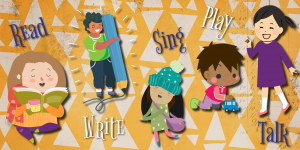
Writing is one of the five early literacy practices, which also include talk, read, sing, and play. Strong writing skills are a precursor to later literacy success. Incorporating writing into your preschooler’s everyday activities helps set them up for achievement in school and in life.
Writing helps children to understand how print and sound work together. In addition, every time your child draws, paints, colors, scribbles or prints, they are building their fine motor skills.
Writing is an essential tool for communication. Think about all the ways in which you use writing every day! It does not come naturally, even to children who appear to pick it up with ease. Your child must learn how to write.
Even though your preschooler may not be writing words yet, you can still support their early writing endeavors. Here’s how you can help!
- Keep writing materials, like crayons, pencils, markers and paper, in a designated spot for your child. Put them within your child’s reach.
- Teach your child how to write their name. If they are not quite there yet, teach them how to write the first letter or first few letters of their name. Point out the first letter of their name each time you see it!
- Practice writing the letters of the alphabet together.
- Mix it up by experimenting with washable paint or head outside with sidewalk chalk. Try writing in sand, salt, or dirt. You can even write with water on the sidewalk.
- Have your child make handmade greeting cards for friends and family members. Your child can sign their name to the cards.
- Put your child’s writing on display. Ask your child to share what they have written aloud.
- Children are natural storytellers. Have your child dictate a story to you while you write it down.
- Make sure your child sees you writing. Involve your child in every day writing activities, like making a shopping list. Talk about each item as you add it to the list. Give your child a pencil and paper and have them make their own list!
- Always encourage your child’s writing, even if it looks like scribbles to you. Ask open-ended questions about what they have written or drawn. Remember, handwriting takes a lot of practice.
- Read with your child daily! Run your finger underneath the words as you read them. Avid readers make great future writers.
Read picture books together that encourage writing, like these:
Amy the Red Panda Is Writing the Best Story in the World
Sources:
-Davida, Children's Librarian, Joel D. Valdez Main Library
 Read, Write, Talk, Sing, Play!
Read, Write, Talk, Sing, Play!
When children are given a chance to explore scribbling, draw pictures, and tell stories, they are learning reading skills. Being an active participant in writing helps keep children excited about reading stories.
Read more about early literacy and how you can make a difference in your child's life.

